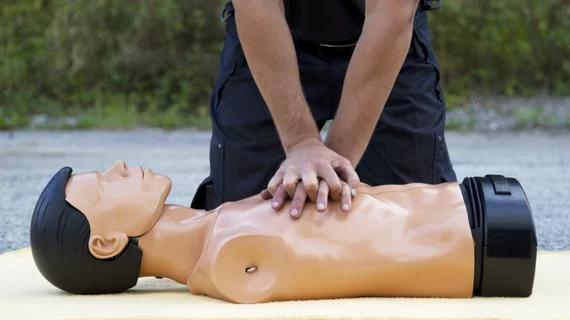3 ways hospital radiology departments can brace for future COVID-like events
With the COVID-19 crisis raging, four radiology educators are bright-lighting their specialty’s need to have in place a plan—along with simulation-based readiness training to execute it—for future mass casualty incidents (MCIs) involving viral outbreaks.
Written by four radiology educators at the University of Southern California’s Keck School of Medicine, the paper, running in JACR, suggests the primary aims of such a radiology MCI plan are to increase throughput of patients who need imaging while protecting staff as well as patients against unprotected exposure.
“Radiologists can play an important adjunct role in triaging and diagnosing patients during a mass casualty incident, including a COVID-19 outbreak,” write Lee Myers, MD, and colleagues. “Even the most efficient radiology department will undergo tremendous stress when victims of a mass casualty flood the emergency department and, in turn, the radiology department.”
The team lays out a three-pronged approach to ensuring a high-value contribution from any hospital’s radiology department during such crises as the one now presented by the COVID-19 outbreak.
1. Build upon your standard radiology MCI plan. “Communicate with your hospital’s emergency medicine leadership and request the institution’s MCI plan, specifically for a viral outbreak,” Myers and colleagues suggest. “This can be used to help structure the radiology plan around the logistics of the emergency department” and should include identifying an ER contact person who’s well versed in the relevant emergency policies and protocols.
2. Contact your hospital’s department of infectious disease. Have this partner department designate a point person to share best practices on cleaning equipment—imaging or otherwise—and on protecting staff and patients, the authors recommend.
3. Coordinate with your department of environmental services on cleaning imaging rooms in normal and extraordinary times like the present. “Request air exchange rates for all stationary equipment rooms to help calculate room downtime between examinations,” Myers and team write.
Myers and colleagues also draw out some details on MCI plan simulations (“Although large-scale simulations can be expensive, time-consuming, require a lot of space and disrupt the day-to-day operations, they have many invaluable benefits”) and in-service training.
For the latter the authors recommend tailoring educational modules not only for radiologists but also any hospital workers who may enter imaging areas.
Noting that the ACR recommends against screening for COVID-19 with CT, Myers et al. point out that, once again, preparing now for things to change later will yield better outcomes all around.
“[A]s prevalence of this disease increases, imaging patients with COVID-19 will increase, i.e., polytrauma, stroke, pulmonary embolism and surgical abdomen,” they conclude. “The radiology department should be ready to mobilize equipment and staff to meet the needs of our patients.”

